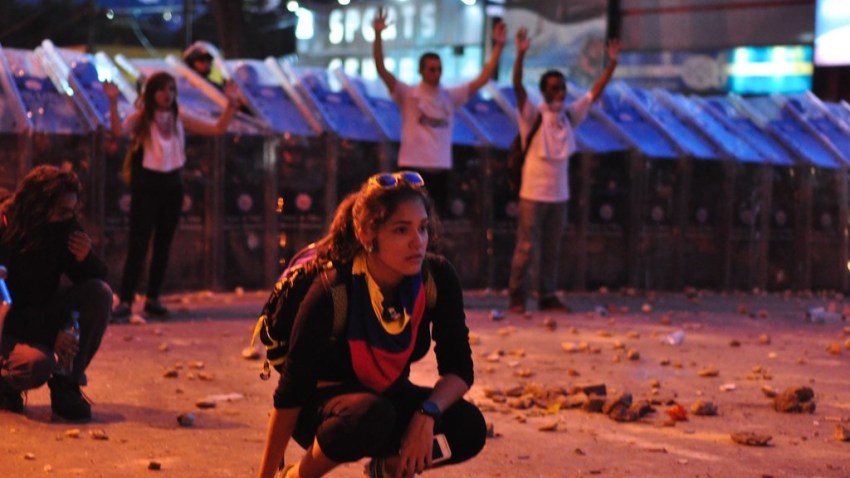The geopolitics surrounding the crisis in Venezuela captures the new normal of inter-American relations. The Union of South American Nations (UNASUR), a regional South American body created in 2008, has stepped up its involvement and, through a three-member delegation of Brazil, Colombia and Ecuador’s foreign ministers, is playing a prominent role in fostering dialogue. Meanwhile, the United States, though keen to shape the post-Chavez trajectory of Venezuela, is in the background, unsure of how to make a constructive impact.
This unfolding episode serves as further reminder that U.S. foreign policy toward South America remains largely unsettled. Washington’s preferences do not have the same weight they once did in the hemisphere. At the same time, Washington faces significant competition from regional players in attempting to shape local dynamics through diplomatic channels. In this context, Venezuela provides a test case for tracking
what path the U.S. will choose in adjusting to the new normal of the much more competitive geopolitics in the hemisphere.
One possible path would be for the U.S. to simply ignore the questions about its limited power projection capabilities and proceed as if it still held the dominant voice. The main problem with such a “flex our muscles” approach is not whether it is moral. The problem is that, in all likelihood, Washington would fail to muster the political capital required for devoting extensive diplomatic resources to a region that is important but not currently crucial to the United States and that is also gaining experience in solving its own problems.
Members of Congress calling for the U.S. to “do more in Venezuela,” as Florida Sens. Bill Nelson and Marco Rubio have recently done, seem to be lobbying for the U.S. to take this approach. The first problem with doing “more” in Venezuela, however, is that it dredges up bad memories of Washington’s historical intolerance for left-wing governments in Latin America. As a result, calling for broad-based sanctions against Venezuelan government officials, and thereby raising the prospect of economic sanctions against Venezuela, may overshadow the current dialogue process in the country. This could allow the government of President Nicolas Maduro to distract attention from the bread and butter governance issues the opposition wants to gain traction on through its face-to-face discussions with the government.
The second problem is that any U.S. attempt to do more in Venezuela would signal blatant disrespect for the UNASUR effort, and may even make Washington appear jealous of others playing a prominent role in regional mediation. In this sense, it could cause greater problems for the United States’ long-term interests in staying relevant in an increasingly competitive geopolitical landscape, marked by the presence not only of UNASUR but also of the Community of Latin American and Caribbean States (CELAC), which includes Central America, the Caribbean and symbolically important Cuba, while excluding the U.S.
The Obama administration seems to be charting a second path that has as its long-term goal maintaining a strong U.S. standing and determining what spaces are available for unilateral action and which issues require multilateral efforts. This path implies a problem-solving strategy where Washington recognizes its comparative power advantages and seeks to harness them. The risk of such a strategy is that it can appear ad hoc, since identifying an opportunity and the ripeness of the moment is made more difficult if there is no grand strategic lens through which to view problems.
In Venezuela, the problem-solving approach is unfolding through the U.S. playing a bit of bad cop to UNASUR’s good cop. The State Department has said it will not take the possibility of targeted sanctions off the table, but Gen. John Kelly, the top official at the U.S. Southern Command in Miami, also offered public support for the dialogue process and seemed to express cautious optimism about the good will shown by both sides so far. The advantage of this approach is that it will allow South America to own the outcome of the dialogue process, whether or not it is successful in chastening chavismo. Should the dialogue fail to achieve that outcome, no fingers would be pointed at the U.S., and pressure would mount on UNASUR to define itself beyond the stereotype of serving as a club for presidents.
Pursuing this line has the added benefit of opening the door to the U.S. shaping UNASUR, an institution still in its formative stages. By playing the game on South America’s court, the U.S. can exert influence over UNASUR, continuing to lobby for American interests via those member countries that are more sympathetic to Washington’s view of the world, pushing Brazil to back up its rhetoric about leadership and showing left-wing governments that the U.S. is willing to listen to proposals from the South. The point here would not be to divide UNASUR against itself as much as to show that it needs to deliver in order to gain legitimacy.
The Venezuelan crisis illustrates the challenges the U.S. faces in influencing South America without enjoying the moral and diplomatic powers it once had. Defining success in terms of both left and right viewing the U.S. as a credible actor that can reliably deliver on both security assistance and on the social agenda would be a crucial first step to charting a constructive path forward.
For instance, Colombia, which the United States practically resuscitated with the multi-billion-dollar Plan Colombia, stands as an example where the U.S. enjoys good standing and can still exert influence, thanks to its pragmatic approach of providing guns and some butter to solve interlinked security and human rights problems.
In the near term, the U.S. should be under no illusions that it can enjoy similar bipartisan support in Venezuela. For now, the United States’ best route back to bipartisan legitimacy in the country with the largest oil reserves in the world passes through supporting regional solutions to regional problems.
Michael McCarthy is a professorial lecturer in Latin American politics at Johns Hopkins University-SAIS.

